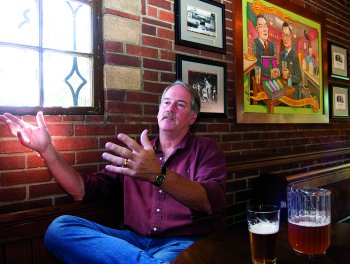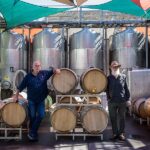 McMenamins is an Oregon-style empire — getting big but still working hard to be quaint.
McMenamins is an Oregon-style empire — getting big but still working hard to be quaint.
BEYOND BEER
|
McMenamins is an Oregon-style empire — getting big but still working hard to be quaint. With more than 2,000 employees, last year the company reached $100 million in gross revenue, a major milestone for a business that was started by two brothers who just wanted to open a cozy pub.
“That’s just a number,” owner Brian McMenamin says, trying to downplay the significance. There never was a steadfast strategy to get where they are, only the humble goal to offer up a good beer. “It’s more organic, not really planned out,” he says.
How many locations are there now? “I am not even sure,” he says. For the record, there are 55.
Despite the success, like many businesses McMenamins is feeling the squeeze of a struggling economy and rising commodity prices such as hops for brewing beer. “We raised prices, we had to,” McMenamin says. “Hopefully it’s just a blip on the radar.”
Known for helping pioneer the craft beer and brewpub craze in the Pacific Northwest, McMenamins has evolved into a stew of brewpubs, restaurants, entertainment venues and restored-buildings-turned-hotels. As the business grows larger another challenge besides the economy is to maintain the image of being small, while also being original with each new venture.
McMenamin smiles when he reflects on the days in 1980 when he was 21 and already the owner of a bar. Then in 1983, he and his older brother, Mike, opened the Barley Mill in Portland. The business expanded from beer making and brewpubs when the brothers bought the Edgefield Manor in 1990, a historic building on 74 acres in the Columbia River Gorge. It was restored into a one-stop shop for lodging, movies and live entertainment, golf, and even winemaking. They liked the “home-like” atmosphere of it.
“It was a natural progression for us,” he says. It was also accidental, because they only started buying old buildings because the brothers saw them as cheaper than newer ones. “We kind of stumbled into the history thing,” he says.
Creative adaptation has helped keep the company moving forward and distinguishing it from the increasing number of craft brewers in the region adopting its brew-pub model.
That adaption includes how McMenamins has recreated itself as a historic building rescuer by buying up old buildings and transforming them into a restaurant or hotel, or both. “We are just caretakers,” Brian says. “It has built-in history.” As this aspect of the business has grown, food sales and lodging now make up the core of their revenue, not beer.
Considering the portfolio of McMenamins locations throughout the Portland-metro area, Brian admits the real-estate bust and economic downturn has hit the business, maybe delaying a project or two, but he says it without apparent worry. Looking to the future instead, he sees other business opportunities. Eventually he wants to have a location in California. He also wants to expand into the baking business.
“We are nervous about being in a box,” McMenamin says. “We fight that every day.”
JASON SHUFFLER
Have an opinion? E-mail [email protected]



